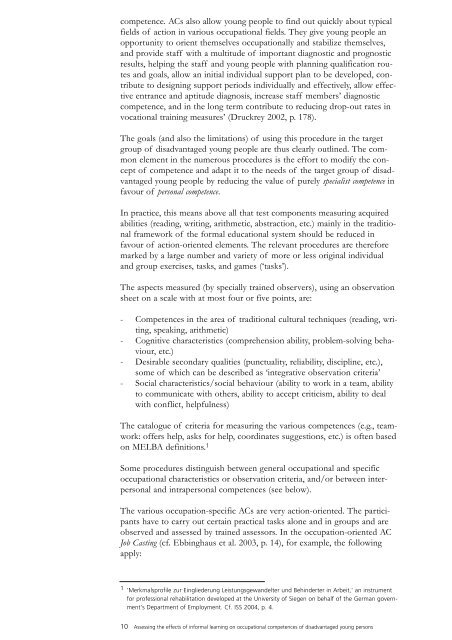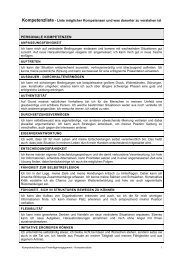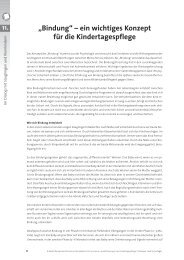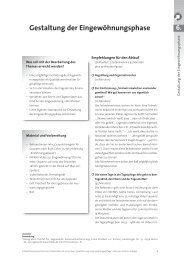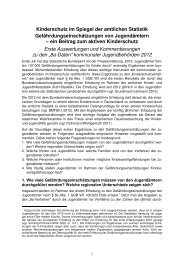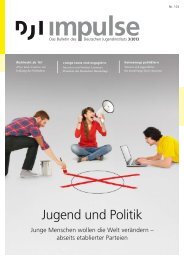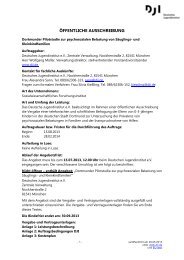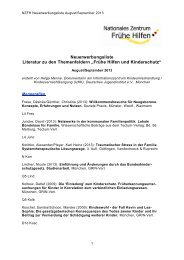Assessing the effects of informal learning on occupational compe ...
Assessing the effects of informal learning on occupational compe ...
Assessing the effects of informal learning on occupational compe ...
Create successful ePaper yourself
Turn your PDF publications into a flip-book with our unique Google optimized e-Paper software.
<strong>compe</strong>tence. ACs also allow young people to find out quickly about typical<br />
fields <str<strong>on</strong>g>of</str<strong>on</strong>g> acti<strong>on</strong> in various occupati<strong>on</strong>al fields. They give young people an<br />
opportunity to orient <str<strong>on</strong>g>the</str<strong>on</strong>g>mselves occupati<strong>on</strong>ally and stabilize <str<strong>on</strong>g>the</str<strong>on</strong>g>mselves,<br />
and provide staff with a multitude <str<strong>on</strong>g>of</str<strong>on</strong>g> important diagnostic and prognostic<br />
results, helping <str<strong>on</strong>g>the</str<strong>on</strong>g> staff and young people with planning qualificati<strong>on</strong> routes<br />
and goals, allow an initial individual support plan to be developed, c<strong>on</strong>tribute<br />
to designing support periods individually and effectively, allow effective<br />
entrance and aptitude diagnosis, increase staff members’ diagnostic<br />
<strong>compe</strong>tence, and in <str<strong>on</strong>g>the</str<strong>on</strong>g> l<strong>on</strong>g term c<strong>on</strong>tribute to reducing drop-out rates in<br />
vocati<strong>on</strong>al training measures’ (Druckrey 2002, p. 178).<br />
The goals (and also <str<strong>on</strong>g>the</str<strong>on</strong>g> limitati<strong>on</strong>s) <str<strong>on</strong>g>of</str<strong>on</strong>g> using this procedure in <str<strong>on</strong>g>the</str<strong>on</strong>g> target<br />
group <str<strong>on</strong>g>of</str<strong>on</strong>g> disadvantaged young people are thus clearly outlined. The comm<strong>on</strong><br />
element in <str<strong>on</strong>g>the</str<strong>on</strong>g> numerous procedures is <str<strong>on</strong>g>the</str<strong>on</strong>g> effort to modify <str<strong>on</strong>g>the</str<strong>on</strong>g> c<strong>on</strong>cept<br />
<str<strong>on</strong>g>of</str<strong>on</strong>g> <strong>compe</strong>tence and adapt it to <str<strong>on</strong>g>the</str<strong>on</strong>g> needs <str<strong>on</strong>g>of</str<strong>on</strong>g> <str<strong>on</strong>g>the</str<strong>on</strong>g> target group <str<strong>on</strong>g>of</str<strong>on</strong>g> disadvantaged<br />
young people by reducing <str<strong>on</strong>g>the</str<strong>on</strong>g> value <str<strong>on</strong>g>of</str<strong>on</strong>g> purely specialist <strong>compe</strong>tence in<br />
favour <str<strong>on</strong>g>of</str<strong>on</strong>g> pers<strong>on</strong>al <strong>compe</strong>tence.<br />
In practice, this means above all that test comp<strong>on</strong>ents measuring acquired<br />
abilities (reading, writing, arithmetic, abstracti<strong>on</strong>, etc.) mainly in <str<strong>on</strong>g>the</str<strong>on</strong>g> traditi<strong>on</strong>al<br />
framework <str<strong>on</strong>g>of</str<strong>on</strong>g> <str<strong>on</strong>g>the</str<strong>on</strong>g> formal educati<strong>on</strong>al system should be reduced in<br />
favour <str<strong>on</strong>g>of</str<strong>on</strong>g> acti<strong>on</strong>-oriented elements. The relevant procedures are <str<strong>on</strong>g>the</str<strong>on</strong>g>refore<br />
marked by a large number and variety <str<strong>on</strong>g>of</str<strong>on</strong>g> more or less original individual<br />
and group exercises, tasks, and games (‘tasks’).<br />
The aspects measured (by specially trained observers), using an observati<strong>on</strong><br />
sheet <strong>on</strong> a scale with at most four or five points, are:<br />
- Competences in <str<strong>on</strong>g>the</str<strong>on</strong>g> area <str<strong>on</strong>g>of</str<strong>on</strong>g> traditi<strong>on</strong>al cultural techniques (reading, writing,<br />
speaking, arithmetic)<br />
- Cognitive characteristics (comprehensi<strong>on</strong> ability, problem-solving behaviour,<br />
etc.)<br />
- Desirable sec<strong>on</strong>dary qualities (punctuality, reliability, discipline, etc.),<br />
some <str<strong>on</strong>g>of</str<strong>on</strong>g> which can be described as ‘integrative observati<strong>on</strong> criteria’<br />
- Social characteristics/social behaviour (ability to work in a team, ability<br />
to communicate with o<str<strong>on</strong>g>the</str<strong>on</strong>g>rs, ability to accept criticism, ability to deal<br />
with c<strong>on</strong>flict, helpfulness)<br />
The catalogue <str<strong>on</strong>g>of</str<strong>on</strong>g> criteria for measuring <str<strong>on</strong>g>the</str<strong>on</strong>g> various <strong>compe</strong>tences (e.g., teamwork:<br />
<str<strong>on</strong>g>of</str<strong>on</strong>g>fers help, asks for help, coordinates suggesti<strong>on</strong>s, etc.) is <str<strong>on</strong>g>of</str<strong>on</strong>g>ten based<br />
<strong>on</strong> MELBA definiti<strong>on</strong>s. 1<br />
Some procedures distinguish between general occupati<strong>on</strong>al and specific<br />
occupati<strong>on</strong>al characteristics or observati<strong>on</strong> criteria, and/or between interpers<strong>on</strong>al<br />
and intrapers<strong>on</strong>al <strong>compe</strong>tences (see below).<br />
The various occupati<strong>on</strong>-specific ACs are very acti<strong>on</strong>-oriented. The participants<br />
have to carry out certain practical tasks al<strong>on</strong>e and in groups and are<br />
observed and assessed by trained assessors. In <str<strong>on</strong>g>the</str<strong>on</strong>g> occupati<strong>on</strong>-oriented AC<br />
Job Casting (cf. Ebbinghaus et al. 2003, p. 14), for example, <str<strong>on</strong>g>the</str<strong>on</strong>g> following<br />
apply:<br />
1 'Merkmalspr<str<strong>on</strong>g>of</str<strong>on</strong>g>ile zur Eingliederung Leistungsgewandelter und Behinderter in Arbeit,' an instrument<br />
for pr<str<strong>on</strong>g>of</str<strong>on</strong>g>essi<strong>on</strong>al rehabilitati<strong>on</strong> developed at <str<strong>on</strong>g>the</str<strong>on</strong>g> University <str<strong>on</strong>g>of</str<strong>on</strong>g> Siegen <strong>on</strong> behalf <str<strong>on</strong>g>of</str<strong>on</strong>g> <str<strong>on</strong>g>the</str<strong>on</strong>g> German government's<br />
Department <str<strong>on</strong>g>of</str<strong>on</strong>g> Employment. Cf. ISS 2004, p. 4.<br />
10 <str<strong>on</strong>g>Assessing</str<strong>on</strong>g> <str<strong>on</strong>g>the</str<strong>on</strong>g> <str<strong>on</strong>g>effects</str<strong>on</strong>g> <str<strong>on</strong>g>of</str<strong>on</strong>g> <str<strong>on</strong>g>informal</str<strong>on</strong>g> <str<strong>on</strong>g>learning</str<strong>on</strong>g> <strong>on</strong> occupati<strong>on</strong>al <strong>compe</strong>tences <str<strong>on</strong>g>of</str<strong>on</strong>g> disadvantaged young pers<strong>on</strong>s


